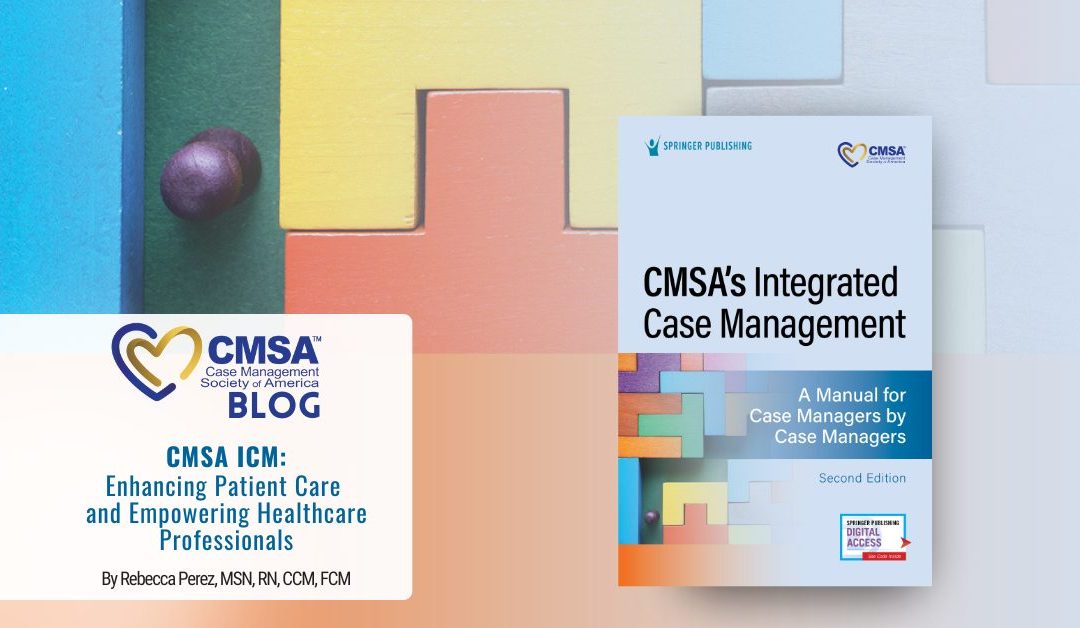By Rebecca Perez, MSN, RN, CCM, FCM
CMSA Integrated Case Management (ICM) Training has emerged as a significant advancement in the realm of healthcare, offering valuable insights and tools for case managers to navigate the complex landscape of patient care. In this blog, we delve into the benefits of ICM training, exploring how it empowers healthcare professionals, enhances patient outcomes, and fosters a culture of continuous improvement. Additionally, we are excited to share news about the release of a newly revised ICM manual, which promises to further enrich the knowledge and capabilities of case managers.
1. Empowering Healthcare Professionals:
At the heart of ICM training lies its commitment to empowering healthcare professionals with essential skills and knowledge. Through ICM, case managers undergo comprehensive training that equips them to handle the multifaceted challenges they encounter in their roles. By developing a deeper understanding of patient needs and the intricacies of care coordination, ICM-trained professionals are better prepared to provide patient-centered solutions.
2. Enhancing Patient Care:
One of the primary goals of ICM training is to elevate patient care and outcomes by providing a holistic view of patients' medical conditions, social circumstances, and unique requirements. Armed with this comprehensive understanding, they can design personalized care plans that cater to individual patient needs, leading to improved health outcomes and higher patient satisfaction.
3. Bridging Communication Gaps:
Effective communication is a cornerstone of quality healthcare. ICM training emphasizes the importance of clear and efficient communication among all stakeholders involved in a patient's care journey. By honing their communication skills, case managers facilitate seamless collaboration between healthcare providers, patients, and their families, fostering a cohesive and patient-centric care environment.
4. Navigating Complex Healthcare Systems:
The healthcare landscape is constantly evolving, presenting case managers with complex and ever-changing regulations and policies. ICM training equips these professionals with the knowledge and tools to navigate this intricate web of healthcare systems adeptly. Staying up to date with industry trends and best practices, ICM-trained case managers can optimize resource allocation and streamline processes for more effective and efficient care delivery.
5. Promoting Quality Improvement:
Embracing a culture of continuous improvement is paramount in healthcare. ICM training instills this value in case managers, encouraging them to identify areas for enhancement and implement evidence-based strategies. By adopting a data-driven approach to decision-making, ICM-trained professionals can elevate the quality of care they provide, fostering a constant drive towards better patient outcomes.
6. Recognition and Growth Opportunities:
ICM training is highly regarded within the healthcare industry, and rightly so. Healthcare organizations value the expertise of ICM-trained case managers for their ability to optimize patient care and operational efficiency. ICM training opens doors to exciting career opportunities and leadership roles, as these professionals are recognized for their dedication to delivering high-quality care.
7. The Newly Revised ICM Manual:
In line with our commitment to staying at the forefront of advancements in case management, we are thrilled to announce the release of a newly revised Integrated Case Management manual. This updated resource will equip case managers with the necessary tools and information to excel in their roles, ensuring they remain well-prepared to meet the ever-evolving challenges of healthcare.
Integrated Case Management Training has proven to be a transformative approach in the practice of case management. With the release of the newly revised ICM manual, we look forward to witnessing the positive impact it will have on case managers and, ultimately, on the quality of care provided to patients.
Get your copy of CMSA's Integrated Case Management: A Manual for Case Managers by Case Managers (2nd Edition): https://cmsapmg.wpenginepowered.com/integrated-case-management/ Members, make sure you’re logged into your member account. The discount code will be visible at the bottom of the ICM page when you’re logged in. Not a member? Join today!
Bio: Rebecca is an experienced Registered Nurse with a master’s degree in nursing, is a Certified Case Manager, a member of the Omega Gamma Chapter of Sigma Theta Tau International Nursing Honor Society, Capella University National Society of Leadership and Success, a member of the National Quality Forum Leadership Consortium and most recently was bestowed the Fellow in Case Management distinction. Her most recent works are primary author for Case Management Society of America Integrated Case Management: A manual for Case Managers by Case Managers 2nd Edition, CMSA’s Case Management Adherence Guide 2020, CMSA’s Case Management Adherence and Transition of Care Guide for Clostridiodes difficile, CMSA’s Case Management Adherence and Transitions of Care Guide for Hepatic Encephalopathy, Opioid Use Disorder Guide for Case Managers, and Antimicrobial Stewardship Guide for Case Managers. She is the author of numerous professional articles and resources for CMSA, and speaker on case management topics. She is the Senior Manager of Education for CMSA and Executive Director for the Case Management Society Foundation.

